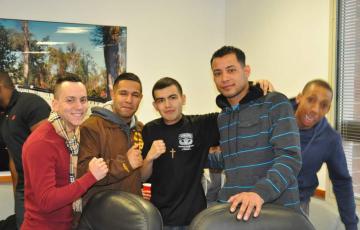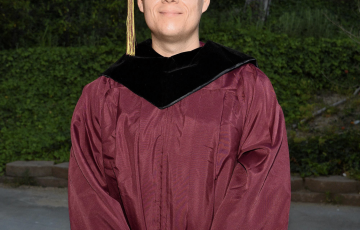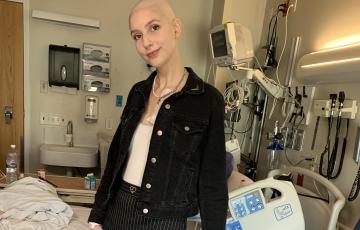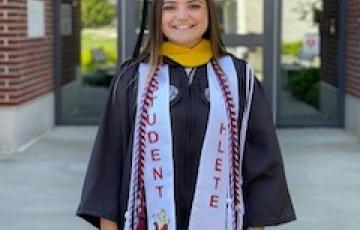Search Results

Rebecca
My mother died of multiple myeloma (MM) in 2001, 10 months after her diagnosis. She lived in a small town where the only treatment they offered her was chemo infusions. She was on dialysis the whole time. She was brave but scared, nonetheless. She didn't have much time to process the whole experience. I was 51 at the time and still believed I was bullet-proof! Silly girl!
Suesan
During caregiving for my partner, Dil, cancer has acted as a proctor of lessons we would have rather gone without. I have become more aware of accessibility issues because the chemotherapy and radiation treatment combined with overwhelming doses of steroids led to him having spinal fractures which impeded his mobility. Now when we go to a movie, are traveling, or generally getting around, I come armed with a pillow for his chair, he with his cane, an eye trained for impassable curbs or spaces that he can't comfortably navigate.

Maverick
My son, Maverick, a vibrant and spirited young boy, faced a daunting challenge at just 20 months old. His journey began with alarming symptoms — relentless nosebleeds, unexplained bruises, and a petechial rash that spread rapidly. Within three days of the first symptom, he was diagnosed with B-cell acute lymphoblastic leukemia (B-ALL) on July 14, 2022. It was like we found the first symptom on day one, and by day three, he had a cancer diagnosis.
Diagnosis
An accurate diagnosis of the type of leukemia is important. The exact diagnosis helps the doctor to estimate how the disease will progress and determine the appropriate treatment
Diagnosing acute myeloid leukemia (AML) and your AML subtype usually involves a series of tests. Some of these tests may be repeated during and after therapy to measure the effects of treatment.
Radiation Therapy
Radiation therapy, also known as “radiotherapy,” uses high energy x-rays or other types of radiation to kill cancer cells. While most blood cancers cannot be cured with radiation therapy alone, it may be combined other treatments such as chemotherapy, immunotherapy and stem cell transplantation. Radiation therapy may also be used to relieve symptoms of blood cancer and improve quality of life. For example, radiation therapy may be used to shrink an enlarged spleen, liver or lymph nodes. It may also be used to manage bone pain caused by cancer cells growing in the bone marrow.
Healthy Eating
People living with cancer may have different nutrition goals and challenges, depending on their:
Managing Insurance and Expenses During Illness
It's important to resolve financial issues before they become a source of increased stress or limit your access to needed treatments, prescription medications or support services. Therefore, discuss payment options with members of your healthcare team or the treatment centers' patient financial services department. Patients and providers can work together to devise ways to reduce costs without compromising treatment. Ask your providers about:
Caring for Your Child During Treatment
Preparing the HomeThe following changes to your home may make life easier and safer for you and your child:
Stem Cell Transplantation
The goal of stem cell transplantation is to cure the patient’s cancer by destroying the cancer cells in the bone marrow with high doses of chemotherapy and then replacing them with new, healthy blood-forming stem cells. The healthy blood stem cells will grow and multiply forming new bone marrow and blood cells. There are two main types of stem cell transplantation. They are
CML Phases and Prognostic Factors
CML has three phases. The phase of your chronic myeloid leukemia (CML) plays a large part in determining the type of treatment you'll receive. Doctors use diagnostic tests to determine the phase of CML. Determining the CML phase is based primarily on the number of immature white blood cells (blasts) in the patient’s blood and bone marrow.
Phases of CMLChronic Phase. Most patients are diagnosed with CML in the with chronic phase of the disease.
People with chronic phase CML:
CML in Children and Young Adults
Most cases of CML occur in adults. From 2012 to 2016, approximately 2 percent of all cases of CML occurred in children, adolescents and young adults less than age 20.
Are Clinical Trials Safe?
U.S. clinical trials are designed to give patients the safest, potentially most effective clinical therapies. Clinical trials are conducted once researchers have shown in the laboratory and in animal research that a particular study treatment has a good chance of offering better outcomes for people with a specific disease.
Patients enrolled in cancer clinical trials are never treated as “guinea pigs.” In fact, patients are given either
Peripheral Neuropathy
Cancer treatment, or sometimes the disease itself, can cause peripheral neuropathy (PN) — damage to nerves of the peripheral nervous system, which transmits information from the brain and spinal cord to every other part of the body. Peripheral neuropathy can be caused by:
Home Care
You don't necessarily need to depend on inpatient medical facilities to meet all your healthcare needs. If your condition allows, you can get the quality care you need at home and avoid the inconveniences of hospitals, nursing homes and rehabilitation facilities.

Barbara
At age 60, I stopped working as a full-time physical therapist and started working PRN at two different facilities. My reasoning was I could help my elderly but healthy parents when needed and help out with my grandkids. Everything was going great until the COVID-19 pandemic hit. I was laid off from both jobs. My father was very afraid of COVID-19 and wouldn’t let my mom leave the house, so I started doing all of their shopping. I had been fatigued for months but attributed this to work or being out of shape.

Santino
I was diagnosed with anaplastic large cell lymphoma (ALCL) and underwent an autologous bone marrow transplant back in 2015. By the grace of God, I have been cancer-free for seven years. I was inspired to write some poems after my experience. One of them has actually been published. I hope my poems bring hope to the many cancer warriors out there fighting for their lives. If you are fighting cancer at this very moment, never quit. Remember, you have cancer, cancer does not have you. Every second your heart beats, you always have a chance. God has the final say.

Kate
On May 17, 2018, our family was thrown into the world of blood cancer. Our family's patriarch, our bonus dad, and our beloved "Candy Boy," as he was affectionately nicknamed by his youngest daughter, found out that he was in the aggressive stages of acute myeloid leukemia (AML).

Timothy
I am an awardee of The Leukemia & Lymphoma Society’s (LLS) Scholarship for Blood Cancer Survivors. I currently hold an associate’s degree in science and am pursuing my bachelor's degree in biology at California State University, San Bernardino, (CSUSB). I am very grateful to be granted this scholarship to help pay for my tuition. In fact, this is the first scholarship I have ever been awarded during my education. These funds are a big stress reliever as it has provided me with the ability to avoid taking out a loan for school and given me peace of mind.

Megan
Megan is my daughter. She was diagnosed in April 2020 with stage 2 Hodgkin lymphoma (HL) at the age of 16. At the time, Megan was finishing up her sophomore year of high school. Due to the pandemic, school was virtual, and even though she had a month and a half to go, she finished with straight A’s while receiving chemo. She would go on to have four cycles that included 16 rounds of chemo. Her cancer was still not completely gone, so a 21-day regimen of radiation was administered.
Landon
My cancer journey began on June 24, 2018. A month before that day, I'd experienced chest pains, night sweats, and shortness of breath. After scheduling a doctor's appointment, my primary physician determined that it was merely an upper respiratory infection. For a week, I took the medicine prescribed by my doctor, hoping that I would soon feel well again. With little to no signs of improvement, I scheduled another appointment for Monday, June 25th. We didn't make it to that appointment, because on June 24th, I lost oxygen and passed out.

Alyssa
From December 2021-January 2022, I had just come off orientation for my new job as a registered nurse. I was working the night shift and just thought I was experiencing the "usual" night shift symptoms. I was ALWAYS tired, had terrible back pain, and had such a shift in my appetite. I went for a physical just to be sure. My bloodwork was normal (slightly elevated WBC but told it could have been from stress at work), and my doctor sent me for physical therapy for my back pain. After going to physical therapy for weeks with no improvement, I noticed a lump on my neck.
